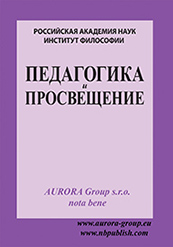Pedagogy
Reference:
Glebova L.N., Guseva N.V.
Addictive behavior of the younger generation: problems, solutions
// Pedagogy and education.
2024. № 3.
P. 1-15.
DOI: 10.7256/2454-0676.2024.3.70948 EDN: MRDRTO URL: https://en.nbpublish.com/library_read_article.php?id=70948
Abstract:
The article deals with the problem of the lack of a system of preparing subjects for the organization of psychological and pedagogical prevention of the younger generation in a general education institution, which will ensure the formation and development of a professionally competent personality of an employee of the modern field of education. The concept of addictive behavior of adolescents and the prevention of dependent behavior as a complex system and process, a unified concept and integration of efforts of the psychological and pedagogical community of educational institutions in modern socio-cultural conditions is considered. The problem of education and upbringing of the younger generation is very relevant today. This is due to the physical and psychological insecurity of a person due to the political, economic, and cultural realities of modern society. From these positions, it is the sphere of education, from our point of view, that should become a kind of foundation that guarantees respect for the rights of an individual in the field of his physical and psychological health. The authors studied the attitude of participants in the educational process of the Nizhny Novgorod region (Volga Federal District, Russia): teachers, administrative workers in the field of education, students and their legal representatives to the organization of psychological and pedagogical prevention of dependent behavior of adolescents in a general education institution, and the system of work of specialists in the prevention of dependent behavior of adolescents in a general education institution has been tested. The analysis showed that the key problem areas are: the creation of a system of value orientations of adolescents, the inculcation of generally accepted social norms; the creation of conditions for the prevention of coping strategies of adolescents, the formation of skills of responsible behavior, self-control and problem-solving planning skills; as well as the promotion of a healthy lifestyle among adolescents, which indicated the general need to increase the competence of employees in the indicated aspect. Based on the results of research and analysis of the experience of educational institutions, a system of prevention of dependent behavior of adolescents in a general education institution has been developed and described.
Keywords:
teenager, staff, administrative staff, educational institutions, school, psychological and pedagogical prevention, modern teenagers, prevention of addictive behavior, addictive behavior, dependent behavior of adolescents
Educational psychology
Reference:
Khasieva M.A.
Prospects for the development of educational computer games in the context of the theory of the "state of flow" by M. Csikszentmihalyi
// Pedagogy and education.
2024. № 3.
P. 16-26.
DOI: 10.7256/2454-0676.2024.3.71124 EDN: XDDSJH URL: https://en.nbpublish.com/library_read_article.php?id=71124
Abstract:
The subject of the study concerns one of the most significant problems of computer gamification of education – the question of criteria for the development and evaluation of educational computer games, including optimization of their game mechanics, game structure and forms of integration of players into their space, taking into account their specifics, goals and main educational purpose. The concept of "game flow", which originated in the gaming industry under the influence of the theory of the "state of flow" by M. Csikszentmihalyi, represents an original interpretation of the criteria of internal motivation of human activity and, as the goal of game design, assumes the achievement of the highest immersiveness of the game and the creation of space for the construction of meanings. The concept of game flow is widely used in modern trends in the development of educational games: the use of innovative game mechanics that complement and enrich the traditional and most common model of PBL gamification and allow achieving the greatest human involvement in the process of playing and learning is gaining great promise in them. The article uses a comprehensive methodological approach, including a descriptive method applied to various concepts of learning gamification and motivation theories, as well as a comparative and hermeneutic analysis of research on the development of educational computer games. The scientific novelty of the research is due to the correlation of the concept of game flow and the theory of the state of flow by M. Csikszentmihalyi with the main tasks of educational games and trends in their development. The conclusions of the article state that the development of virtual, augmented and mixed reality technologies, 3D visualization, and the improvement of computer graphics open up new prospects for the use of computer games in education, including in the humanities. Despite the fact that the issue of determining the prospects for the development of computer learning games is solved in modern pedagogy by studying the mechanisms of formation of internal motivation and involvement in learning, the theory of the "state of flow" by M. Csikszentmihalyi is of great interest in this sense. Optimization of the game mechanics of modern educational computer games is aimed at personalization, creating a space of free choice for the player and involves individual selection of the level of difficulty of tasks. These and other characteristics of game design can significantly improve the effectiveness of training.
Keywords:
Csikszentmihalyi, flow state concept, immersive learning, gamification of learning, game flow theory, game design of educational games, digitalization of the educational environment, video games in training, serious games, the concept of the game
 This work is licensed under a Creative Commons Attribution-NonCommercial 4.0 International License.
This work is licensed under a Creative Commons Attribution-NonCommercial 4.0 International License.










 © 1998 – 2024 Nota Bene. Publishing Technologies. NB-Media Ltd.
© 1998 – 2024 Nota Bene. Publishing Technologies. NB-Media Ltd.




